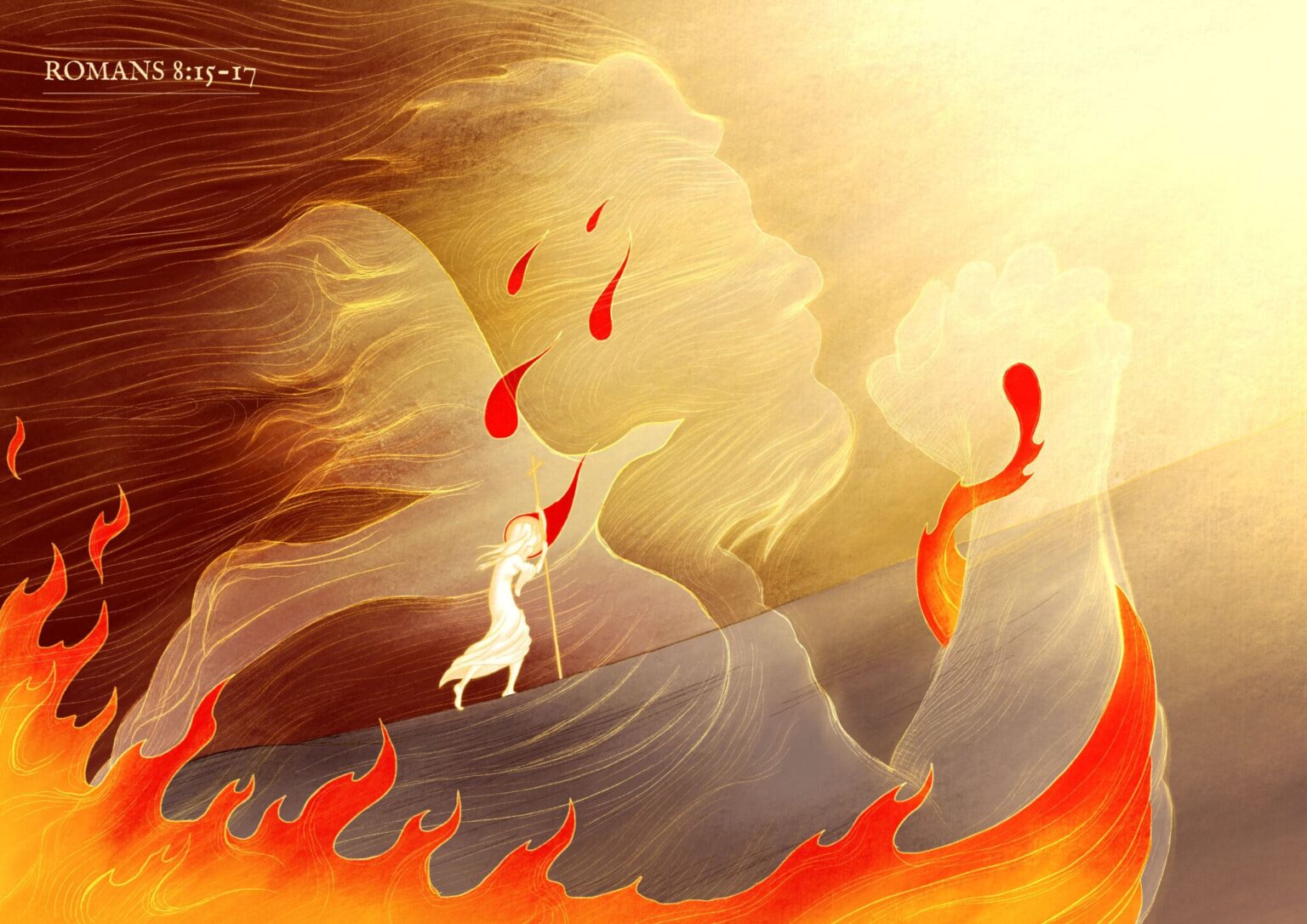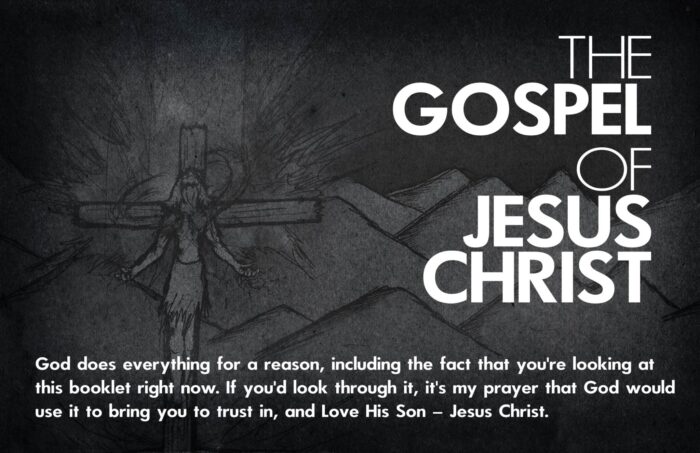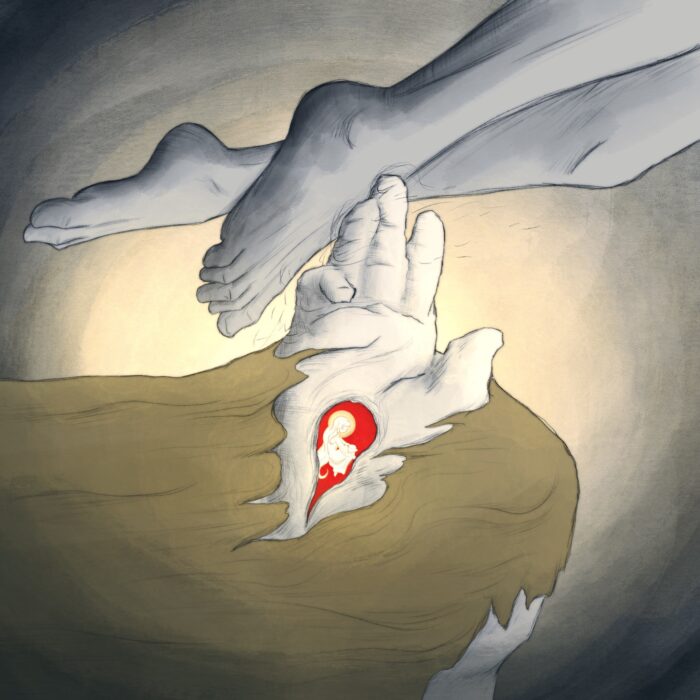
“For you did not receive the spirit of slavery to fall back into fear, but you have received the Spirit of adoption as sons, by whom we cry, ‘Abba, Father!’ The Spirit himself bears witness with our spirit that we are children of God, and if children, then heirs—heirs of God and fellow heirs of Christ, provided we suffer with him in order that we may also be glorified with him.” – Romans 8:15-17
The Passage Explained
Establishing Preceding Context — In Christ and In the Spirit
Verse 15 begins with the word “for,” which means—among other things—that we need to go back and consider what Paul has said earlier in order to get the full import of his meaning for verse 15. Ultimately, Paul’s train of thought goes back all the way to the beginning of chapter 8, and even earlier than that. However, for the sake of this explanation, I think we only need to look back as far as verse 12. In verse 12, Paul concludes that those who are “in Christ Jesus” (8:1), and thus “in the Spirit” (8:9), must no longer live “according to the flesh,” which is to say, they must no longer live in obedience to desires that oppose the character of God.
In verse 13 he explains why someone who is in Christ must no longer live this way, bluntly stating that those who live “according to the flesh” will die. The death in view here is not simply physical death (certainly everyone will die physically). Paul goes further than that, implying that those who live in willful opposition to the character and commands of God in Christ will perish; that is to say, they will be cut off from God—they will be damned. Why must we no longer live according to the flesh? Because those who do so will be condemned. Thus if we are truly in Christ we must not, and—indeed—cannot live in unrepentant opposition to God.
The second half of verse 13 offers the alternative. If by the Spirit the Christian puts to death the deeds of the body, they will live. An active war against one’s own sin is a defining mark of those who are truly in Christ. But does this mean that the Christian’s war on sin saves them? Is Paul saying that one is brought into eternal life because they put their own sin to death? Not exactly, as verse 14 shows.
In verse 14, Paul explains why it is that those who make war on sin by the Spirit live while those who refuse to make war on their own sin perish. Its not because the one who puts their sin to death makes themselves cleaner than the one who does not, rather it is because:
“…all who are led by the Spirit of God are sons of God.”
Sometimes when people talk about the “leading of the Spirit” they are referring to a sense that they ought to give money to a person in need, or say something at a specific time, or make a life decision. But this is not what Paul has in mind in verse 14. Rather, the “leading of the Spirit” in this passage seems to be entirely concerned with the context of verse 13, namely killing the “deeds of the flesh,” i.e., sin. The Holy Spirit is the Spirit of God and of Christ. He is the Spirit who leads us toward the truth, goodness, and beauty of God in Christ (John 16:13), and who rejoices to glorify the Son of God (John 16:14). Just as surely as a beach ball submerged in a pool will rise to the surface or the aroma of baking cookies will fill a room, so too If the living and active power of the Spirit of God has taken up residence at the roots of a human soul, He will lead them to make war on their own sin.
Paul says that everyone so led (i.e., everyone driven by the Spirit of God to kill their own sin so that they might more fully enjoy the Father in the Son) proves themselves to be a son (or daughter) of God. But why is this the case? Why is it that those who are led by the Spirit of God are sons of God?” It is because the Spirit who leads them is none other than the Spirit of Sonship, the Spirit of Adoption, the Spirit of the Beloved Son whose indwelling presence makes former rebels into beloved sons and daughters.
Romans 8:15 — Adoption As Sons
For you did not receive the spirit of slavery to fall back into fear, but you have received the Spirit of adoption as sons, by whom we cry, ‘Abba, Father!’
The Spirit whom believers in Christ have received from the Father is the Spirit, not of slavery, but of adoption. Paul intentionally contrasts two different “spirits” in this verse, using the negative image of the “spirit of slavery” to highlight the positive reality of the “Spirit of adoption.” Lets briefly look at the way the two spirits contrast.
Slavery and Adoption
The Spirit of Slavery
First, we have the spirit of slavery contrasted with the Spirit of adoption. The slavery that Paul has in mind is likely slavery to sin (See Romans 6:6, 16-17, 19-20). Sin is a deceptive master. It convinces its slaves that they are actually free, actually doing what they want, actually following their own heart, even as they dig themselves further into its thralldom. And, of course, it is true that slaves of sin are free to “do whatever they want” (Romans 6:20), the problem is that they cannot want what is good (i.e., God in Christ) and only want what leads to their own enslavement and eventual destruction (i.e., choosing anything other than God in Christ as supreme). To be a slave to sin means—in the end—to “fall back into fear”—which we will examine more closely in a moment. But first, lets look at the Spirit ofadoption.
The Spirit of Adoption
The “spirit of slavery” does not seem to refer to a specific entity, rather it implies the controlling, animating power of one’s life (the way we might refer to someone having a passionate spirit or a humble spirit). However, the “Spirit of adoption” most likely refers to the Holy Spirit Himself, the Spirit of the Beloved Son who enters in and makes one-time rebels into beloved children. Paul’s metaphor for adoption is drawn from the Greco-Roman world where it was fairly common for a wealthy man to “adopt” a son who would subsequently become his heir. According to New Testament scholar Richard Longnecker, there are at least four elements of adoption in the ancient world which Paul and his contemporaries would have been familiar with, these are:
- An adopted son was taken out of his previous situation and placed in an entirely new relationship to his new adopting father, who became his new [family head].
- An adopted son started a new life as part of his new family, with all his old debts canceled.
- An adopted son was considered no less important than any other biologically born son in his adopting father’s family.
- An adopted son experienced a changed status, with his old name set aside and a new name given him by his adopting father.
(From “The Epistle to the Romans” by Richard N. Longenecker)
It is likely that Paul had at least these four concepts in mind when he talks about Christians as having received the “Spirit of adoption.” Unlike their previous life as slaves of sin, in their new life as adopted sons and daughters, the saints are identified with and by their Father, they are washed of all that once defined them, they are treasured by the Father as His own beloved ones, and are marked—as it were—with His own name. An awesome concept….and one that we will be “growing into” for all of eternity, as Paul makes clear when he says that we are already adopted now, and yet awaiting an (apparently fuller experience of) adoption yet to come (Romans 8:23).
Fear or Father
Falling into Fear
Secondly, the two contrasting spirits of slavery and adoption lead to two contrasting responses. Firstly, as I alluded to above, the response of one who lives in a spirit of slavery will ultimately be fear.
What exactly would it mean to “fall…into fear?” I would contend that, at root, fear is the belief that the power behind the universe is opposed to us. Now, at first you might not see the reasoning here, but consider: where does fear get its power? Is it not that it threatens situations or events or happenings that we desperately want to avoid? And further, beyond the simply threat of them happening, does fear not derive much of its bone-chilling power from the insinuation that these feared events will somehow define us, will somehow “last,” will somehow irreparably mark us? Ultimately, Fear’s power lies in its promise of a night with no morning, of a winter with no spring, of a story that ends in sadness.
Yet, the only story that truly ends in sadness is the story of one steadfastly opposed to God, the story of one who is damned. And so, Fear’s power derives from its ability to convince its victim that God—whether they think of Him as a personal being or whether He is suppressed into a vague uneasiness in the back of their mind—that God is ultimately against them and that in the end, they will be hurt, scarred, abandoned and without hope. This is just what John implies when he tells us that “fear has to do with punishment” (1 John 4:18). All fear is, at root, fear of the final and irreversible judgment of God. Fear of hell.
With this understanding of fear, it is not hard to see why those who are slaves to sin will—sooner or later—fall into fear. The fact is that slaves of sin are opposed to the power behind the universe, they have made God their enemy and if they continue on their path they will be shut out from the heart of love and joy and grace. This kind of slavery must result in fear because the slave has no where to turn except themselves, and the self is a fortress of cards…a fortress that—though it may stand during this life—will be blasted to powder before the hurricane force winds of Judgment Day. When the slave of sin turns their eyes toward the throne of reality they will see a consuming fire, they will see one who is purely opposed to them in their current state, they will see one who—to them—is the “King of Terrors” (Job 18:14). There is nowhere for such a one to receive true and lasting relief from fear except to fall before that throne, repent of their opposition, and receive by faith the Spirit of adoption as sons—which is where we turn next.
Crying to our Father
Paul says the the spirit of slavery leads into fear, while the Spirit of adoption as sons leads the one thus adopted to cry out “Abba, Father!” The contrasting parallel between these two results is profound—the former, having made himself an enemy of God, spirals into the cold night of hopelessness; the latter, extending the child like arms of faith, hope and love by the working of the Spirit, is gathered as a son into the Father-heart of God.
The term “Abba, Father” is significant for at least two reasons. The first is that “Abba,” as an intimate term of affection used of children for their fathers, points to humility, dependence, simple adoration, affection, and all that a young child might feel toward their father. The fact that Paul gives this word as a title for God to those who trust in Christ is paradigm-shifting, to the point that Richard Longnecker (mentioned above) says that this word “provides the key to the new relationship that exists between God and his people throughout the NT presentations of the Christian gospel.” One cannot imagine a stronger contrast to the fear of damnation engendered by a spirit of slavery than the simple cry of “Abba, Father” flowing from the Spirit of adoption.
However, there is a second and even deeper significance to Paul’s use of “Abba” as a title for God, and that is found in Mark 14:36. There, in the Garden of Gethsemane, the reader is invited into the inner sanctum of Christ’s passion as He offers up His will on the altar of love-driven obedience to the Father. And out of that furnace of affection and agony, the word that rises from the heart of the Son to His Father is the same word we find on the lips of Christians in Romans 8:15 — “Abba,” Father.
How can this be? How can Paul take the intimate title that the eternal Son uses to address the eternal Father in the moment of His greatest desperation and place that treasure in the mouths of people like you and me? People who were once enemies of God? The implications here are amazing. Just as, in the Garden, the Son pours out His heart to the Father by the Spirit in cry of “Abba, Father” so now the Christian, filled with the same Spirit, addresses God with the same word and is received with the same love. By sending the Spirit of adoption into the hearts of His redeemed people, God has folded one-time rebels into His own intratrinitarian fellowship of love. We have been whisked past the guardian cherubim, past the fiery seraphim, past the flashes of thunder and peals of lightning, through the impenetrable darkness, through the unapproachable light, and there—at the very heart of the Triune God—have been seated at the Father’s table next to the Son Himself, the Spirit filling the room with mutual love and have been invited to feast on the fullness of God’s own house and to drink from the river of His own delights (Psalm 36:8) as a beloved child…loved as Christ Himself is loved (John 17:23)—Glory to God for this inexpressible gift (2 Corinthians 9:15)!
The spirit of slavery alienates us from the fellowship of God and so throws us into the grip of fear. However, the Spirit of adoption folds us into the fellowship of God as beloved children, placing in our hearts and on our lips the cry of Christ Himself, the title God the Son uses for God the Father: Abba.
Fellow Heirs
While there is much to say concerning verses 16 and 17, this write up is focused on verse 15, so I will cover these final verses in only a cursory way. In verse 16 Paul points to the Spirit-kindled cry of the Christian to God as Father as a strong indicator that they are truly adopted children in Christ. Following this in verse 17, he draws out a profound implications of the Christian’s adoption by the Father through the Spirit in the Son, namely, that they have become fellow heirs with Christ. This statement is almost too staggering to receive. The Christian—a human being who was once set as an enemy toward God—the Christian has been adopted into the family of the Triune God, and is now considered a fellow heir with God the Son.
What will the Son inherit? All things (1 Corinthians 15:27, Colossians 1:16, etc.). And in Him, as an adopted child of God, the Christian will also inherit all things (1 Corinthians 3:21-23). As those who have been welcomed into familial fellowship with God in Christ, we dust-born believers will one day receive and be granted grace to enjoy the whole of created reality. What will that be like? It would take pages and pages more even to begin a consideration, but suffice to say, it will be utterly and pervasively centered on the beauty of God in Christ….inheriting creation will not cause creation itself to become our treasure, rather—since the universe will be saturated with the glory of God in His Son (Isaiah 11:9, Habakkuk 2:14), every enjoyment of our inheritance will be an enjoyment of our God.
And lastly, it must be noted that Paul includes a caveat. We will prove to be fellow heirs with Christ if indeed we suffer with Him. Again, much could and ought to be said on this crucial and practical concept. But, for now suffice to say that the one who has truly been filled with the Spirit of adoption will not fall away when suffering comes. Rather, like their elder brother in Gethsemane, they will turn their eyes to the throne of the universe and cry out in desperation and blood-secured hope, “Abba, Father!”
The Picture Explained
An argument might be made that the entire New Testament theology of adoption is bound up in understanding that single phrase, “Abba, Father!” Because of its central place in the doctrine, I made this cry of Christ in Gethsemane (and His adopted siblings throughout the ages) the central theme of this image.
Dominating this scene you’ll notice the profile of Christ praying in Gethsemane. The conspicuous use of this image sets the stage for the entire picture and anchors the concept of adoption in the “only begotten” Son. More specifically, the image of Christ’s prayer in Gethsemane anchors adoption in His incarnation, suffering, and death for the sake of those who were to become beloved sons and daughters in Him. Adoption can only happen because the Son Himself came as one of us to dwell among us. Indeed, adoption can only happen because the Beloved and eternal Son was exiled, was abandoned, was rejected on the cross in our place.
This leads to the second element I’d like to address, namely, the fire. Fire here represents the wrath of God, which is—as I explained in the write-up above—ultimately the only thing that humanity has to truly fear. Divine wrath is the fuel of all fear. Wrath features prominently in this image because wrath is precisely what the Beloved Son bore in the place of the rebels who were to be folded into His family. In fact, the agony of Gethsemane flowed from Christ’s recognition that He would have to receive the full and undiluted “cup” of God’s wrath on the cross. It is there, during that excruciating sacrifice of His will to the Father in the garden, that we see Jesus call out to God as His “Abba” and so exemplify for us the paradigm of intimacy, desperation, dependence, and hope that marks our own adopted relationship with God. It is also important to see that the wrath is being “swallowed up” into the wounds of Christ’s pleading hands. In the garden and on the cross, the eternal Son bore the wrath that we deserved in His own body so that we might now come to God as our Father.
Before moving on to the believer herself, note also that the Holy Spirit—represented as a dove—forms the center of the praying figure of the Son. The presence of the Spirit here serves to represent the Spirit of adoption granted to Christians, but also to show that the eternal Son Himself cried out to God the Father through/in/by the Spirit. In other words, the Holy Spirit is not doing “foreign” work when He mediates the child/Father relationship between Christians and their God; He is only doing between us and the Father what He has eternally done between the Son and the Father, namely, served as the uniting bond of personal love.
Which leads to the Christian herself. She is clothed in white to show the imputed righteousness she has received via union to the Son by the Spirit. She leans on a cruciform staff as an expression of the absolute centrality that the gospel of the glory of Christ holds for every step of the Christian journey. The Spirit of adoption envelopes her and she is—quite literally in this image—within the eternal Son Himself. This is an attempt to visually express the concept that the Spirit of adoption “folds us in” to the very same relationship of intratrinitarian intimacy with the Father that the Son Himself knew during His life on this earth.
Recall that I said above that the only thing we ultimately have to fear is the idea of God as our enemy, aka of hell. This is the fear that the one given over to the spirit of slavery will surely fall into. However, the one who has received the Spirit of adoption does not need to fear because God is their Father—His wrath has turned away. I tried to communicate this truth by showing the saint walking out of and away from the fire (representative of wrath / enmity with God). But see that she is not merely avoiding it, rather it has been swallowed up into the wounds of Christ’s death and resurrection. The adopted child of God has no need to fear. God is for her in Christ (Romans 8:31) because everything that it would mean for God to be against her has been absorbed by the death of the Son in her place.
Lastly, the five drops of blood flowing from Christ’s forehead echo both His suffering in our place in Gethsemane as well as the five wounds that He is traditionally thought to have received on the cross. The fifth drop cover the saint’s head for two reasons. First, notice that her halo—representing her righteousness/sanctification/




